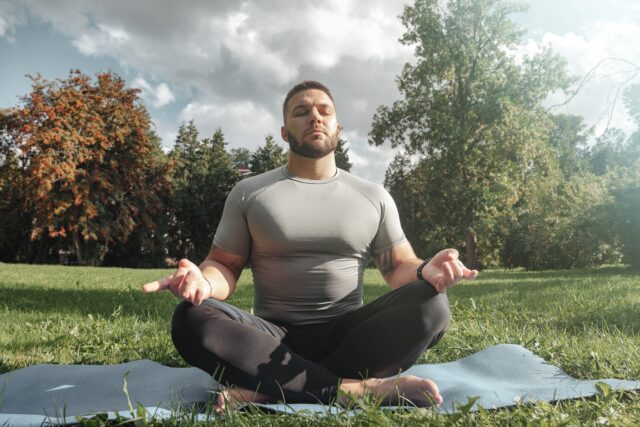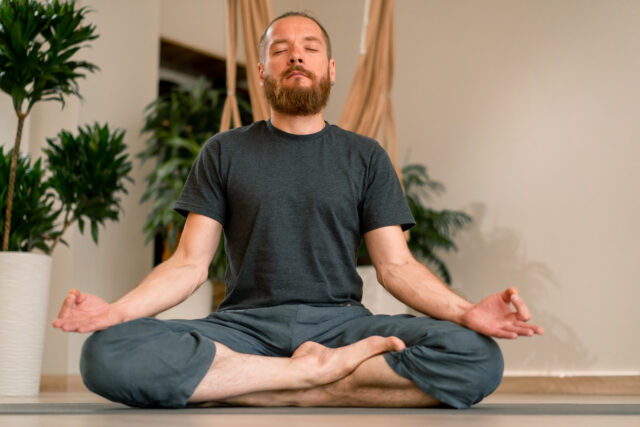Anxiety is a daily part of life for a lot of people — 20% of UK adults confirm as much, according to the Mental Health Foundation.

However, there’s a difference between feeling slightly on edge and having a full-blown spiral that leaves you feeling panicked, overwhelmed, and even dangerously unwell. While you can’t control your psychological responses to stress in life, there are some things you can do to try and self-soothe and calm yourself when you feel your anxiety escalating.
1. Take a deep breath (or ten).

When anxiety hits, our breathing often becomes shallow and quick. Slow, deep breaths can help calm your body’s stress response. Try breathing in for four counts, holding for four, and exhaling for four. Repeat this a few times, and you might notice your heart rate slowing down.
2. Ground yourself with the 5-4-3-2-1 technique.

This simple exercise can help bring you back to the present moment. Name 5 things you can see, 4 things you can touch, 3 things you can hear, 2 things you can smell, and 1 thing you can taste. It’s a quick way to shift your focus from anxious thoughts to your immediate surroundings.
3. Challenge your thoughts.

Anxiety often involves catastrophic thinking. Ask yourself: Is this thought realistic? What evidence do I have for and against it? What would I tell a friend in this situation? Sometimes, a bit of logical thinking can help put things in perspective.
4. Move your body.

Physical activity can be a powerful anxiety-buster. It doesn’t have to be a full workout — a quick walk, a few jumping jacks, or even some stretches can help release tension and boost your mood. The change of scenery can also interrupt anxious thought patterns.
5. Reach out to someone.

Talking to a close friend or family member can help you feel less alone and might give you a fresh perspective. Even if you don’t want to discuss what’s bothering you, a bit of social connection can be soothing. A quick text or call can make a big difference.
6. Write it down.
 Source: Unsplash
Source: Unsplash Putting your worries on paper can help you organise your thoughts and might make them feel more manageable. You don’t need to write an essay — even a quick list or a few sentences can help get those swirling thoughts out of your head.
7. Use a calming app or video.

There are loads of free apps and videos designed to help with anxiety. Try a guided meditation, a relaxation exercise, or even some calming music. Having a go-to resource can be really helpful when anxiety strikes.
8. Engage in a simple, repetitive task.
 Source: Unsplash
Source: Unsplash Activities like colouring, knitting, or even tidying up can be surprisingly calming. They give your hands something to do and your mind something to focus on, which can help break the cycle of anxious thoughts.
9. Limit your caffeine intake.
 Source: Unsplash
Source: Unsplash If you’re prone to anxiety, caffeine can sometimes make it worse. Try cutting back on coffee, tea, and energy drinks, especially later in the day. You might be surprised at how much calmer you feel.
10. Create a ‘worry time’.

Set aside a specific time each day to think about your worries. If anxious thoughts pop up outside this time, jot them down to revisit later. This can help you feel more in control and prevent worries from taking over your whole day.
11. Practice self-compassion.

Be kind to yourself. Anxiety doesn’t mean you’re weak or failing. Treat yourself with the same kindness you’d offer a friend. Remember, everyone struggles sometimes, and that’s okay.
12. Use positive affirmations.

Simple phrases like “This will pass” or “I can handle this” can be surprisingly powerful. Find a few that resonate with you and repeat them when anxiety strikes. It might feel a bit odd at first, but give it a chance.
13. Focus on what you can control.

Anxiety often revolves around things we can’t change. Try to identify what’s actually within your control and focus your energy there. Making a small, positive change can help you feel more empowered.
14. Establish a bedtime routine.

Anxiety and poor sleep often go hand in hand. Creating a calm, consistent bedtime routine can help. Try to wind down at the same time each night, maybe with a book or some gentle stretches. Your body and mind will start to associate these activities with relaxation.




